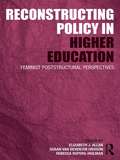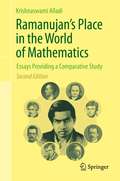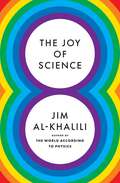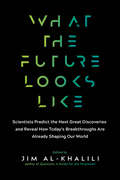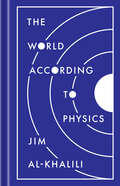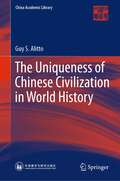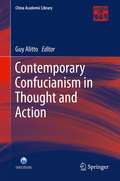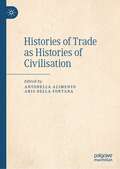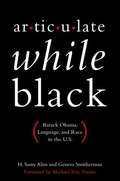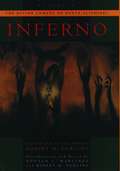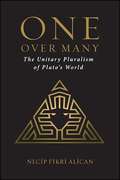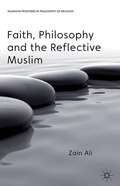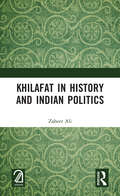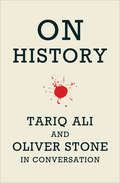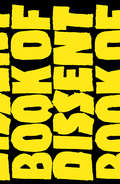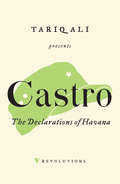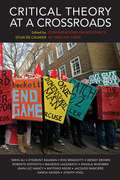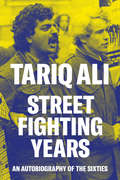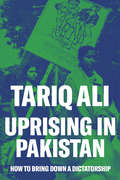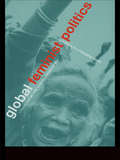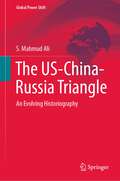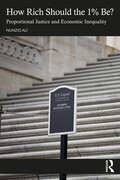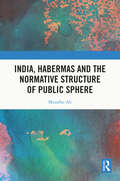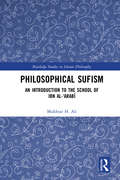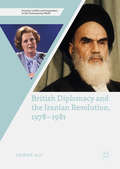- Table View
- List View
Reconstructing Policy in Higher Education: Feminist Poststructural Perspectives
by Elizabeth J. Allan Susan Iverson Rebecca Ropers-HuilmanReconstructing Policy in Higher Education highlights the work of accomplished and award-winning scholars and provides concrete examples of how feminist poststructuralism effectively informs research methods and can serve as a vital tool for policy makers, analysts, and practitioners. The research examines a range of topics of interest to scholars and professionals including: purposes of Higher Education, administrative leadership, athletics, diversity, student activism, social class, the history of women in postsecondary institutions, and quality and science in the globalized university. Students enrolled in Higher Education and Educational Policy programs will find this book offers them tools for thinking differently about policy analysis and educational practice. Higher Education faculty, managers, deans, presidents, and policy makers will find this book contributes significantly to their own policy analysis, practice, and discourse. Elizabeth J. Allan is an Associate Professor of Higher Education at the University of Maine where she is also an affiliated faculty member with the Women’s Studies program. Susan V. Iverson is an Assistant Professor of Higher Education Administration & Student Personnel at Kent State University where she is also an affiliated faculty member with the Women’s Studies Program. Rebecca Ropers-Huilman is a Professor of Higher Education at the University of Minnesota.
Ramanujan's Place in the World of Mathematics: Essays Providing a Comparative Study
by Krishnaswami AlladiThe First Edition of the book is a collection of articles, all by the author, on the Indian mathematical genius Srinivasa Ramanujan as well as on some of the greatest mathematicians in history whose life and works have things in common with Ramanujan. It presents a unique comparative study of Ramanujan’s spectacular discoveries and remarkable life with the monumental contributions of various mathematical luminaries, some of whom, like Ramanujan, overcame great difficulties in life. Also, among the articles are reviews of three important books on Ramanujan’s mathematics and life. In addition, some aspects of Ramanujan’s contributions, such as his remarkable formulae for the number pi, his path-breaking work in the theory of partitions, and his fundamental observations on quadratic forms, are discussed. Finally, the book describes various current efforts to ensure that the legacy of Ramanujan will be preserved and continue to thrive in the future.This Second Edition is an expanded version of the first with six more articles by the author. Of note is the inclusion of a detailed review of the movie The Man Who Knew Infinity, a description of the fundamental work of the SASTRA Ramanujan Prize Winners, and an account of the Royal Society Conference to honour Ramanujan’s legacy on the centenary of his election as FRS.
The Joy of Science
by Jim Al-KhaliliQuantum physicist, New York Times bestselling author, and BBC host Jim Al-Khalili reveals how 8 lessons from the heart of science can help you get the most out of lifeToday’s world is unpredictable and full of contradictions, and navigating its complexities while trying to make the best decisions is far from easy. The Joy of Science presents 8 short lessons on how to unlock the clarity, empowerment, and joy of thinking and living a little more scientifically.In this brief guide to leading a more rational life, acclaimed physicist Jim Al-Khalili invites readers to engage with the world as scientists have been trained to do. The scientific method has served humankind well in its quest to see things as they really are, and underpinning the scientific method are core principles that can help us all navigate modern life more confidently. Discussing the nature of truth and uncertainty, the role of doubt, the pros and cons of simplification, the value of guarding against bias, the importance of evidence-based thinking, and more, Al-Khalili shows how the powerful ideas at the heart of the scientific method are deeply relevant to the complicated times we live in and the difficult choices we make.Read this book and discover the joy of science. It will empower you to think more objectively, see through the fog of your own preexisting beliefs, and lead a more fulfilling life.
What the Future Looks Like: Scientists Predict the Next Great Discoveries—and Reveal How Today's Breakthroughs Are Already Shaping Our World
by Jim Al-KhaliliScience fact, not science fiction, on the cutting–edge developments that are already changing the course of our future Every day, scientists conduct pioneering experiments with the potential to transform how we live. Yet it isn’t every day you hear from the scientists themselves! Now, award–winning author Jim Al–Khalili and his team of top-notch experts explain how today’s earthshaking discoveries will shape our world tomorrow—and beyond.Pull back the curtain on: genomicsroboticsAIthe “Internet of Things”synthetic biologytranshumanisminterstellar travelcolonization of the solar systemteleportationand much moreAnd find insight into big–picture questions such as:Will we find a cure to all diseases? The answer to climate change? And will bionics one day turn us into superheroes? The scientists in these pages are interested only in the truth—reality–based and speculation–free. The future they conjure is by turns tantalizing and sobering: There’s plenty to look forward to, but also plenty to dread. And undoubtedly the best way to for us to face tomorrow’s greatest challenges is to learn what the future looks like—today.
The World According to Physics
by Jim Al-KhaliliQuantum physicist, New York Times bestselling author, and BBC host Jim Al-Khalili offers a fascinating and illuminating look at what physics reveals about the worldShining a light on the most profound insights revealed by modern physics, Jim Al-Khalili invites us all to understand what this crucially important science tells us about the universe and the nature of reality itself.Al-Khalili begins by introducing the fundamental concepts of space, time, energy, and matter, and then describes the three pillars of modern physics—quantum theory, relativity, and thermodynamics—showing how all three must come together if we are ever to have a full understanding of reality. Using wonderful examples and thought-provoking analogies, Al-Khalili illuminates the physics of the extreme cosmic and quantum scales, the speculative frontiers of the field, and the physics that underpins our everyday experiences and technologies, bringing the reader up to speed with the biggest ideas in physics in just a few sittings. Physics is revealed as an intrepid human quest for ever more foundational principles that accurately explain the natural world we see around us, an undertaking guided by core values such as honesty and doubt. The knowledge discovered by physics both empowers and humbles us, and still, physics continues to delve valiantly into the unknown.Making even the most enigmatic scientific ideas accessible and captivating, this deeply insightful book illuminates why physics matters to everyone and calls one and all to share in the profound adventure of seeking truth in the world around us.
The Uniqueness of Chinese Civilization in World History (China Academic Library)
by Guy S. AlittoThe book is a meticulous work in answering these questions which often occur to foreigners as well as modern Chinese themselves at the thought of the old China and its experience in modern times: What is Chinese civilization? How could it exist for several millennia and spread that far? Is there anything inherent in this civilization?From the standpoint of an “outsider” to this civilization, the author incorporates various elements, such as geographic factors, language, thoughts, with the recurrent themes along the two thousand years and changes throughout, rather than simply following a lineal progression. His historiographical approach, the methodology of eclectic common sense, as he termed it, is a new try in this field and will present a brand new perspective for both readers and researchers in that field.
Contemporary Confucianism in Thought and Action (China Academic Library)
by Guy AlittoThis volume focuses on contemporary Confucianism, and collects essays by famous sinologists such as Guy Alitto, John Makeham, Tse-ki Hon and others. The content is divided into three sections - addressing the "theory" and "practice" of contemporary Confucianism, as well as how the two relate to each other - to provide readers a more meaningful understanding of contemporary Confucianism and Chinese culture. In 1921, at the height of the New Culture Movement's iconoclastic attack on Confucius, Liang Shuming (梁漱溟) fatefully predicted that in fact the future world culture would be Confucian. Over the nine decades that followed, Liang's reputation and the fortunes of Confucianism in China rose and fell together. So, readers may be interested in the question whether it is possible that a reconstituted "Confucianism" might yet become China's spiritual mainstream and a major constituent of world culture.
Histories of Trade as Histories of Civilisation
by Antonella Alimento Aris Della FontanaThis edited collection explores the histories of trade, a peculiar literary genre that emerged in the context of the historiographical and cultural changes promoted by the histoire philosophique movement. It marked a discontinuity with erudition and antiquarianism, and interacted critically with universal history. By comparing and linking the histories of individual peoples within a common historical process, this genre enriched the reflection on civilisation that emerged during the long eighteenth century. Those who looked to the past wanted to understand the political constitutions and manners most appropriate to commerce, and grasp the recurring mechanisms underlying economic development. In this sense, histories of trade constituted a declination of eighteenth-century political economy, and thus became an invaluable analytical and practical tool for a galaxy of academic scholars, journalists, lawyers, administrators, diplomats and government ministers whose ambition was to reform the political, social and economic structure of their nations. Moreover, thanks to these investigations, a lucid awareness of historical temporality and, more particularly, the irrepressible precariousness of economic hegemonies, developed. However, as a field of tension in which multiple and even divergent intellectual sensibilities met, this literary genre also found space for critical assessments that focused on the ambivalence and dangers of commercial civilisation. Examining the complex relationship between the production of wealth and civilisation, this book provides unique insights for scholars of political economy, intellectual history and economic history.
Articulate While Black: Barack Obama, Language, And Race In The U. S.
by H. Samy Alim Geneva Smitherman Michael Eric DysonBarack Obama is widely considered one of the most powerful and charismatic speakers of our age. Without missing a beat, he often moves between Washington insider talk and culturally Black ways of speaking--as shown in a famous YouTube clip, where Obama declined the change offered to him by a Black cashier in a Washington, D.C. restaurant with the phrase, "Nah, we straight." <p><p>In Articulate While Black, two renowned scholars of Black Language address language and racial politics in the U.S. through an insightful examination of President Barack Obama's language use--and America's response to it. In this eloquently written and powerfully argued book, H. Samy Alim and Geneva Smitherman provide new insights about President Obama and the relationship between language and race in contemporary society. <p><p>Throughout, they analyze several racially loaded, cultural-linguistic controversies involving the President--from his use of Black Language and his "articulateness" to his "Race Speech," the so-called "fist-bump," and his relationship to Hip Hop Culture. Using their analysis of Barack Obama as a point of departure, Alim and Smitherman reveal how major debates about language, race, and educational inequality erupt into moments of racial crisis in America. <p><p> In challenging American ideas about language, race, education, and power, they help take the national dialogue on race to the next level. In much the same way that Cornel West revealed nearly two decades ago that "race matters," Alim and Smitherman in this groundbreaking book show how deeply "language matters" to the national conversation on race--and in our daily lives.
The Divine Comedy of Dante Alighieri: Volume 1 Inferno
by Dante Alighieri Robert M. Durling Ronald L. MartinezThis is the first volume of a new prose translation of Dante's epic - the first in twenty-five years. Robert Durling's translation brings a new power and accuracy to the rendering of Dante's extraordinary vision of Hell, with its terror, pathos, and sardonic humour, and its penetrating analyses of the psychology of sin and the ills that plague society. A newly edited version of the Italian text can be on facing pages, and this edition includes fully comprehensive notes as well as sixteen essays on special subjects.
One over Many: The Unitary Pluralism of Plato's World (SUNY series in Ancient Greek Philosophy)
by Necip Fikri AlicanFinalist for the 2022 PROSE Award in the Philosophy category presented by the Association of American PublishersOne over Many is a groundbreaking interpretation of Plato's philosophical outlook, solving longstanding problems in the scholarly literature. Its originality and its strength consist in replacing the metaphysical dualism of the traditional interpretation with the paradigm of unitary pluralism: one world with a gradation of reality, including three different types of Forms, as well as the entire spectrum of sensible phenomena, with intermediate ontological constructs in between. The model thus combines a monism of worlds with a pluralism of things, positing a unitary reality of infinite possibilities through ontological stratification. This tightly integrated collection of essays, conceived and developed by the author in pursuit of corrective intervention in Plato’s metaphysics, combines his previously published work with newly drafted material for the present volume. The book replaces the standard view of Plato as a metaphysical dualist with a novel interpretation providing greater explanatory power through the paradigm of unitary pluralism in a single reality built on ontological diversity.
Faith, Philosophy and the Reflective Muslim
by Zain AliMost modern literature on the rationality of religious belief is primarily written from Christian and Secular perspectives, the introduction of a reflective Muslim perspective provides a fresh and alternative perspective. This work aims to pioneer an engagement with contemporary philosophical scholarship from the perspective of a reflective Muslim
Khilafat in History and Indian Politics
by Zaheer AliThis book is a brief historical account of Khilafat, an Islamic political institution mired in controversies from its inception. It is an attempt to present an objective critique of the Islamic polity that, in a way, was primarily responsible for crafting schisms in Islam with its commencement. By the time the last Khilafat of the Ottomans came to an end in the aftershock of the Second World War, the Muslim political elite in India launched a movement for the restoration and continuation of the Ottoman Khilafat. The most paradoxical dimension of the issue was that in the Arab peninsula, the epicenter of Islam, the people were struggling to cast away the yoke of the Ottoman Khilafat, then why were the Indian Muslims emotionally involved in a movement that was vehemently condemned and assailed by a majority of Muslims outside the Indian subcontinent? This title is co-published with Aakar Books. Print editions not for sale in South Asia (India, Sri Lanka, Nepal, Bangladesh, Pakistan and Bhutan)
On History: Tariq Ali and Oliver Stone in Conversation
by Tariq Ali Oliver StoneIn working together on two challenging new documentaries--South of the Border and the forthcoming thirteen-part, thirteen-hour Forgotten History of the United States series for Showtime--filmmaker Oliver Stone engaged with author and filmmaker Tariq Ali in a probing, hard-hitting conversation on the politics of history. Their dialogue brings to light a number of forgotten--or deliberately buried--episodes of American history, from the US intervention against the Russian Revolution to the dynamic radicalism of the Wobblies; how Henry Wallace's nomination for the vice presidency was deliberately thwarted by Democratic Party machine insiders, to the ongoing close connections between various US presidents and the Saudi royal family. For Stone and Ali--two of our most insightful observers on history and popular culture--no topic is sacred, no orthodoxy goes unchallenged. Tariq Ali is an internationally acclaimed Pakistani writer and filmmaker. He has written more than two dozen books on world history and politics and seven novels (translated into over a dozen languages) as well as scripts for the stage and screen. He is an editor of New Left Review and lives in London. Oliver Stone has directed, among other films, Wall Street: Money Never Sleeps, W., World Trade Center, Any Given Sunday, Nixon, Natural Born Killers, Heaven and Earth, JFK, The Doors, Born on The Fourth of July, Talk Radio, Wall Street, Platoon, Salvador, and the documentaries Looking for Fidel, Comandante, Persona Non Grata, South of the Border, and the upcoming Forgotten History of the United States series for Showtime.
The Verso Book of Dissent: Revolutionary Words from Three Millennia of Rebellion and Resistance
by Tariq Ali Audrea Lim Andrew HsiaoThroughout the ages and across every continent, people have struggled against those in power and raised their voices in protest--rallying others around them and inspiring uprisings in eras yet to come. Their echoes reverberate from Ancient Greece, China and Egypt, via the dissident poets and philosophers of Islam and Judaism, through to the Arab slave revolts and anti-Ottoman rebellions of the Middle Ages. These sources were tapped during the Dutch and English revolutions at the outset of the Modern world, and in turn flowed into the French, Haitian, American, Russian and Chinese revolutions. More recently, resistance to war and economic oppression has flared up on battlefields and in public spaces from Beijing and Baghdad to Caracas and Los Angeles.This anthology, global in scope, presents voices of dissent from every era of human history: speeches and pamphlets, poems and songs, plays and manifestos. Every age has its iconoclasts, and yet the greatest among them build on the words and actions of their forerunners. The Verso Book of Dissent will become an invaluable resource, reminding today's citizens that these traditions will never die.
The Declarations of Havana (Revolutions Ser.)
by Tariq Ali Fidel CastroIn response to the American administration’s attempt to isolate Cuba, Fidel Castro delivered a series of speeches designed to radicalize Latin American society. As Latin America experiences more revolutions in Venezuela and Bolivia, and continues to upset America’s plans for neo-liberal imperialism, renowned radical writer and activist Tariq Ali provides a searing analysis of the relevance of Castro’s message for today.
Critical Theory at a Crossroads: Conversations on Resistance in Times of Crisis
by Tariq Ali Zygmunt Bauman Rosi Braidotti Wendy Brown Roberto Esposito Maurizio Lazzarato Angela McRobbie Jean-Luc Nancy Antonio Negri Jacques Rancière Saskia Sassen Joseph VoglWe are living in an age of crisis—or an age in which everything is labeled a crisis. Financial, debt, and refugee “crises” have erupted. The word has also been applied to the Arab Spring and its aftermath, Brexit, the 2016 U.S. election, and many other international events. Yet the term has contradictory political and strategic meanings for those challenging power structures and those seeking to preserve them. For critics of the status quo, can the rhetoric of crisis be used to foment urgency around issues like climate change and financialization, or does framing a situation as a “crisis” play into the hands of the existing political order, which then seeks to tighten the leash by creating a state of emergency?Critical Theory at a Crossroads presents conversations with prominent theorists about the crises that have marked the past years, the protest movements that have risen up in response, and the use of the term in political discourse. Tariq Ali, Rosi Braidotti, Wendy Brown, Maurizio Lazzarato, Angela McRobbie, Jean-Luc Nancy, Antonio Negri, Jacques Rancière, Saskia Sassen, and Joseph Vogl offer their views on contemporary challenges and how we might address them, candidly discussing the alternatives that new social movements have offered, alongside an exchange between Zygmunt Bauman and Roberto Esposito on theories of community. Sparring over crucial developments in these past years of catastrophe and the calamity of everyday life under capitalism, they shed light on how crises and the discourse of crisis can both obscure and reveal fundamental aspects of modern societies.
Street Fighting Years: An Autobiography of the Sixties
by Tariq AliOne of the world’s best-known radicals relives the early years of the protest movementWhat makes a young radical? Reissued to coincide with the fiftieth anniversary of 1968, Street Fighting Years captures the mood and energy of an era of hope and passion as Tariq Ali tracks the growing significance of the 1960s protest movement, as well as his own formation as a leading political activist.Through his personal story, he recounts a counter-history of a sixties rocked by the Prague Spring, student protests on the streets of Europe and America, the effects of the Vietnam war, and the aftermath of the revolutionary insurgencies led by Che Guevara. It is a story that takes us from Paris and Prague to Hanoi and Bolivia, encountering along the way Malcolm X, Bertrand Russell, Marlon Brando, Henry Kissinger, and Mick Jagger.This edition includes the famous interview conducted by Tariq Ali and Robin Blackburn with John Lennon and Yoko Ono In 1971.
Uprising in Pakistan: How to Bring Down a Dictatorship
by Tariq AliPakistan 1968: the history of a revolutionThe story of what happened in 1968 in Pakistan is often forgotten, but is proof of a global revolutionary moment. In that year, following years of tumult, a radical coalition - led by Zulfikar Ali Bhutto - brought down the military presidency of Ayub Khan. Students took on the state apparatus of a corrupt and decaying military dictatorship backed by the US. They were joined by workers, lawyers, white-collar employees, and despite the severe repression, they took hold of power. Through a series of strikes, demonstrations and political organising a popular uprising was born.In his riveting account of these events, Tariq Ali offers an eye witness perspective to history, showing that this powerful popular movement was one of the most revolutionary moments of the twentieth century. The victory led to the very first elections in the country, and the birth of a modern nation.
Global Feminist Politics: Identities in a Changing World
by Suki Ali Kelly Coate Wangui Wa GoroGlobal Feminist Politics examines the changing global context for feminist political action, its meaning and forms. It acknowledges the existence of dissent and debate among feminists, asserting that such debate leads to innovation in theory and practice. This book reaches the conclusion that the future of the women's movement depends upon a dialogue which is unafraid to cut across perceived differences.Focusing on key issues raise by a feministic commitment to global political change, this book covers subjects including:* the relevance of contemporary feminist politics for younger women* gendered accounts of genocide and catastrophe* exile, migration and diaspora* gender and the internet* women and the nationalist movement in India* gender issues in Pakistan, Australia, South Africa and the Middle East.Featuring an international panel of cutting-edge feminist thinkers, Global Feminist Politics demonstrates the innovative work being undertaken in the academic and professional worlds, as well as in women's activism. It is an invaluable resource for students in Women's Studies and Development Studies, as well as all those interested in the development of contemporary global feminism.
The US-China-Russia Triangle: An Evolving Historiography (Global Power Shift)
by S. Mahmud AliThis book analyses international relations between the USA, China, and Russia and provides an overview of how the US-China-Russia triangle has evolved over time. Based on a forensic examination of primary documentation from US archives, the author illustrates how the US strategic perspectives on Chinese–Russian relations have developed since the late-19th century. The author demonstrates how US relations with the Russian and Chinese empires began expanding into greater sophistication and complexity in the 19th century, reflecting changing US concerns, priorities, and preferences vis-à-vis Sino-Russian dynamics which themselves, too, were evolving in parallel and, in some instances, in an interactive fashion. The book analyses US perceptions of Sino-Russian interactions in ways which, from the US perspective, affected US interests, either positively or negatively.
How Rich Should the 1% Be?: Proportional Justice and Economic Inequality
by Nunzio AlìHow rich should the 1% be? And, most importantly, when does the distance in economic resources between the richest citizens and ‘us’, the average citizenry, become a concern for justice? This volume explores how excessive economic inequality gives the best-off considerably more political influence than average citizens, thereby violating political equality. It argues that the gap between the best-off and the worst-off should not be reduced because it is good, but rather as an inescapable instrument to protect citizens from the risk of material domination. For this reason, it defends the ‘principle of proportionality’: economic inequality should not exceed a certain range or proportion to enable both the best-off and the worst-off to be co-authors of the legal, political, and socioeconomic rules that govern the ‘social’ relations in which they are involved. Further, the book discusses material domination and explains how money influences politics and what are the remedies for this phenomenon; how social justice should face and harmonise power, poverty, efficiency, individual merit, and economic liberties; and, most importantly, how to determine income and wealth limit ratios in a liberal democracy. A thoughtful investigation on the interdependencies of money and justice and their influence our socio-political systems, this volume will be of great interest to students and researchers of political theory, political philosophy, economics and development, economics theory and philosophy, and social policy.
India, Habermas and the Normative Structure of Public Sphere
by Muzaffar AliThis book examines how the contemporary Indian situation poses a strict theoretical challenge to Habermas’s theorization of the public sphere and employs the method of samvāda to critically analyse and dissect its universalist claims. It invites the reader to consider the possibility of imagining a normative Indian public sphere that is embedded in the Indian context—in a native and not nativist sense—to get past the derivative language of philosophical and political discourses prevalent within Indian academia. The book proposes that the dynamic cooperative space between Indian political theory and contemporary Indian philosophy is effectively suited to theorize the native idea of the Indian public sphere. It underlines the normative need for a natively theorized Indian public sphere to further the multilayered democratization of public spheres within diverse communities that constitute Indian society. The book will be a key read for contemporary studies in philosophy, political theory, sociology, postcolonial theory, history and media and communication studies.
Philosophical Sufism: An Introduction to the School of Ibn al-'Arabi (Routledge Studies in Islamic Philosophy)
by Mukhtar H. AliAnalyzing the intersection between Sufism and philosophy, this volume is a sweeping examination of the mystical philosophy of Muḥyī-l-Dīn Ibn al-ʿArabī (d. 637/1240), one of the most influential and original thinkers of the Islamic world. This book systematically covers Ibn al-ʿArabī’s ontology, theology, epistemology, teleology, spiritual anthropology and eschatology. While philosophy uses deductive reasoning to discover the fundamental nature of existence and Sufism relies on spiritual experience, it was not until the school of Ibn al-ʿArabī that philosophy and Sufism converged into a single framework by elaborating spiritual doctrines in precise philosophical language. Contextualizing the historical development of Ibn al-ʿArabī’s school, the work draws from the earliest commentators of Ibn al-ʿArabī’s oeuvre, Ṣadr al-Dīn al-Qūnawī (d. 673/1274), ʿAbd al-Razzāq al-Kāshānī (d. ca. 730/1330) and Dawūd al-Qayṣarī (d. 751/1350), but also draws from the medieval heirs of his doctrines Sayyid Ḥaydar Āmulī (d. 787/1385), the pivotal intellectual and mystical figure of Persia who recast philosophical Sufism within the framework of Twelver Shīʿism and ʿAbd al-Raḥmān Jāmī (d. 898/1492), the key figure in the dissemination of Ibn al-ʿArabī’s ideas in the Persianate world as well as the Ottoman Empire, India, China and East Asia via Central Asia. Lucidly written and comprehensive in scope, with careful treatments of the key authors, Philosophical Sufism is a highly accessible introductory text for students and researchers interested in Islam, philosophy, religion and the Middle East.
British Diplomacy and the Iranian Revolution, 1978-1981 (Security, Conflict and Cooperation in the Contemporary World)
by Luman AliThis book investigates how British diplomats in Tehran and London reacted to the overthrow of the Shah and the creation of an Islamic Republic in Iran, which had previously been a major political and commercial partner for London in the Middle East. Making substantial use of recently declassified archival material, the book explores the role of a significant diplomatic institution – the resident embassy – and the impact of revolutions on diplomatic relations. It evaluates the performance of those charged with British diplomacy during the Iranian Revolution, as Britain’s position fell from favour under the post-revolutionary regime. Examining the views of key diplomatic personnel at the Foreign and Commonwealth Office and British ministers, this study seeks to explain how British policy towards Iran was shaped and the means of diplomacy employed. In charting the evolution of Britain’s diplomatic relationship with Iran during this period, a number of factors are considered, including historical experience, geography, economics, world politics and domestic concerns. It also highlights the impact of events within the Iranian domestic political scene which were beyond London’s control but which shaped British policy significantly.
